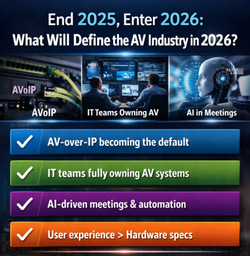From Boardrooms to Classrooms: How AV Tech is Reshaping Work and Education

The way we work and learn has transformed significantly in recent years, largely driven by advancements in audio-visual technology. From AI-powered meeting assistants to augmented reality (AR) classrooms, these innovations are breaking down geographical barriers and enhancing engagement, efficiency and collaboration.
I’ll explore how cutting-edge AV tools are revolutionizing remote collaboration, corporate training and education and what the future holds for virtual interactions.
- AI-Powered Meeting Assistants: Smarter, Faster, More Inclusive:
Messy notes and misheard conversations are becoming a thing of the past. AI-driven AV tools are making meetings more productive and accessible through:
a) Real-Time Transcription & Translation:
- Zoom’s AI Companion transcribes meetings, generates summaries and suggests action items.
- Microsoft Teams’ Speaker Coach analyzes speech patterns, improving clarity and reducing filler words.
- Google Meet’s live translation enables seamless global collaboration.
b) Smart Noise Cancellation & Voice Enhancement:
- Tools like Krisp and NVIDIA RTX Voice eliminate background noise for crystal-clear audio.
- AI can distinguish between speakers, improving meeting recordings and accuracy.
c) Virtual Whiteboards & Interactive Collaboration:
- Platforms like Miro, Microsoft Whiteboard enable real-time brainstorming.
- AI converts handwritten notes into digital text and organizes ideas automatically.
- Virtual Labs & AR-Based Training: The Future of Education
Education and corporate training are no longer confined to physical spaces. AV technology is enabling hands-on, immersive learning experiences:
a) Augmented & Virtual Reality in Education
- Medical students practice surgeries in VR anatomy labs without risk.
- Engineering students interact with 3D holographic machinery models.
- AR apps bring history to life by overlaying historical events onto real-world locations.
b) Remote Science Labs & Simulations
- Platforms like Labster provide virtual chemistry and biology labs for remote experiments.
- NASA and SpaceX use VR simulations to train astronauts.
c) AI Tutors & Personalized Learning
- AI tutors like ChatGPT and DeepSeek provide instant explanations and quizzes.
- AI-driven analytics track student engagement and adapt lessons in real time.
- The Next Frontier: Will Holographic Meetings Replace Zoom?
Remote collaboration is evolving beyond flat screens, with emerging AV technologies such as:
a) Holographic Telepresence:
- Companies like Proto (Los Angeles) and Looking Glass (New York) enable 3D hologram meetings where participants appear as life-sized projections.
- Microsoft Mesh allows avatars to interact in mixed-reality workspaces—NASA is even using it for Mars mission planning.
b) Metaverse Workspaces & Virtual Offices:
- Platforms like Meta Horizon Workrooms and Spatial create immersive meeting spaces in VR.
- Features like digital whiteboards, spatial audio and avatar interactions replicate in-person collaboration.
c) Challenges Ahead:
- Cost & Accessibility: Holographic technology is still expensive.
- Adoption Barriers: Not everyone is ready to embrace VR meetings specially old AV tech schools.
- Privacy Concerns: AI-driven meeting logs raise security and ethical questions.
Let me summaries it : The AV Revolution is Just Beginning !
AV technology is no longer just about better cameras and microphones, it’s fundamentally reshaping how we communicate, learn and collaborate. While AI and VR are already making an impact, the rise of holograms and metaverse workspaces suggests an even more immersive future.
Key Takeaways:
✔ AI meeting assistants improve efficiency and productivity.
✔ AR/VR tools make education and training more interactive.
✔ Holograms and metaverse workspaces could redefine remote collaboration.
What’s Next?
- Will holographic boardrooms become the norm in five years?
- Can VR classrooms replace traditional education?
- How will AI ethics shape the future of AV technology?
Call to Action:
What AV tools have transformed your work or learning experience?
Are you ready for holographic meetings?
Share your thoughts in the comments!
-
Xchange Advocates are recognized AV/IT industry thought leaders and influencers. We invite you to connect with them and follow their activity across the community as they offer valuable insights and expertise while advocating for and building awareness of the AV industry.
Recommended Content
Creating the Next Generation AV Workforce: From Audio Engineers to Solution Designers

End 2025, Enter 2026 (AV Industry)





Please sign in or register for FREE
If you are a registered user on AVIXA Xchange, please sign in
How do we best discern the differences and benefits between the AI-Powered Meeting Assistants? Especially given legal and cybersecurity concerns?
Great question @Matt Pana !
The best way to discern differences between AI-powered meeting assistants is by evaluating key factors like accuracy, security, integrations, and compliance. For instance:
-Accuracy & Features: Some tools, like Zoom’s AI Companion, focus on transcription and action items, while Microsoft Teams’ Speaker Coach analyzes speech patterns.
-Security & Compliance: Enterprise-grade solutions often offer end-to-end encryption, data residency options, and compliance with regulations.
-Privacy Concerns: Understanding how these tools store and process data is crucial, some offer on-device processing, while others rely on cloud-based AI.
I assure that cybersecurity risks are real, especially with AI-driven meeting logs. Companies should vet providers for encryption standards and data retention policies.